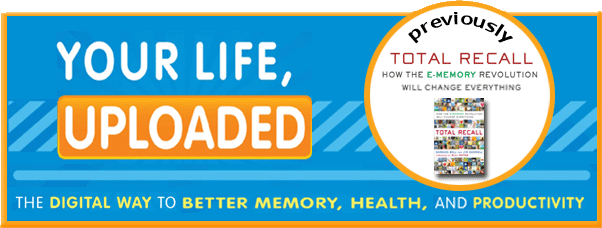Life-loggers not life-bloggers
 Monday, July 6, 2009 at 4:29PM
Monday, July 6, 2009 at 4:29PM We are life-loggers not life-bloggers. Logging my life into a private, secure e-memory sounds like a great idea to me. In contrast, I have absolutely no interest in sharing the complete details of my life with the world in a blog. I want to share a few of my e-memories with some of my friends and family, and even fewer memories with the world. My blogging will be extremely selective.
I view my e-memory as an intimate, private extension of my brain. Not that e-memory functions like human memory. It does not. But in terms of privacy and ownership, it deserves similar treatment. My hope is that society and law will come to recognize it as such. There is attorney-client privilege, and surely my e-memory deserves at least as much privilege.

Reader Comments (2)
Today, a court can compel one to divulge information or face jail time for contempt of court. I wonder how the law would apply if a person was participating in a program that stored e-memories. Would it be simply treated as electronically stored data and the court could seize the system/storage? I do like your analogy of attorney-client privilege, but to some extent I'd think it to be more closely related to the 5th amendment protection as an extension of ourselves. Though I guess that could open a pandora's box of sorts since many of our current electronic devices are extensions of ourselves and store lots of things that one might prefer to remain private. Sorry to use your comment space to wonder aloud.
The issue of privacy for a lifelog is a troubling one. At the moment, in just about all jurisdictions, all it takes is a single subpoena to force you to turn over an image of your data cache. A good lawyer can probably get a subpoena limited to a very specific subset of data, but it will still require a 3rd party to dig through the data and verify that all the ordered data has been provided. I use encryption on my data storage, but it provides zero protection against a court order. This is why I never talk about or discuss my data cache, because it becomes a target if it is known to exist. I expect legislation in the future to provide better legal protection for external memory caches. Another very troubling issue, with various unsatisfying solutions: How should the encryption keys be held and managed after the death of the owner? Who will maintain the data? And what should it be done with it after civilization truly moves into the information era? My thinking at this time is that I'd like my cache to be managed and owned by an AI that is my defacto inheritor. This AI with my memories will be the only afterlife I can manage, I suspect.